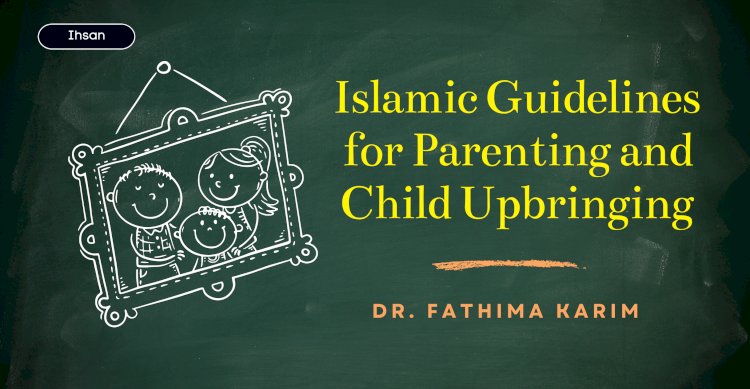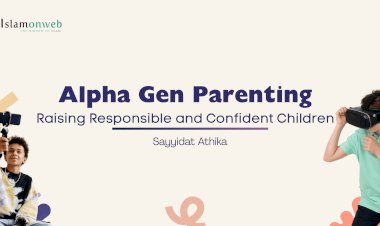Islamic Guidelines for Parenting and Child Upbringing
Parenting and child upbringing in Islam is a significant aspect of a Muslim's life, deeply rooted in the principles of Islamic jurisprudence (Fiqh). These guidelines encompass the moral, spiritual, social, and physical aspects of a child's development, ensuring they grow up as balanced and righteous individuals. This article delves into the core principles derived from the Quran, Hadith, and classical Fiqh literature.
The Role of Intention and Responsibility
In Islam, the intention (niyyah) behind any action is paramount, and this extends to parenting. The Prophet Muhammad (peace be upon him) emphasized that "actions are judged by intentions" (Ṣaḥīḥ al-Bukhārī, Hadith 1)¹. Parents are encouraged to approach the task of raising children with the intention of fulfilling a divine responsibility and cultivating future generations who will contribute positively to the ummah (Muslim community).
Ibn Taymiyyah in "Majmūʿ al-Fatāwā" discusses how a parent's intention should be aligned with seeking Allah's pleasure by raising children who will uphold and propagate Islamic values. He explains that the sincerity of intention transforms mundane tasks of parenting into acts of worship and devotion².
The Importance of Providing a Good Name
Naming a child is an essential duty of parents in Islam. The Prophet Muhammad (peace be upon him) recommended giving children good names, as they have a significant impact on a child's identity and self-esteem. He said, "On the Day of Resurrection, you will be called by your names and by your fathers' names, so give yourselves good names" (Sunan Abī Dāwūd, Hadith 4948)³.
Imam Mālik in "Al-Muwaṭṭaʾ" highlights that a good name serves as a lifelong source of positive identity and motivation for the child. He also mentions that names with good meanings often bring about good fortune and divine blessings⁴. Al-Nawawi, in his commentary on "Ṣaḥīḥ Muslim", adds that a good name is a form of supplication (duʿāʾ) for the child’s righteous character⁵.
The Right to Proper Education
Islam places a strong emphasis on seeking knowledge. The Prophet Muhammad (peace be upon him) said, "Seeking knowledge is obligatory upon every Muslim" (Sunan Ibn Mājah, Hadith 224)⁶. Parents are responsible for providing their children with both religious and worldly education. This dual approach ensures that children are well-rounded and can navigate both spiritual and practical aspects of life.
Ibn Taymiyyah elaborates in "Majmūʿ al-Fatāwā" that education should start with the fundamentals of faith, teaching children the pillars of Islam, followed by practical knowledge that enables them to contribute effectively to society. He emphasizes that religious education should include the Quran, Hadith, and Fiqh, while worldly education should encompass essential life skills and vocational training⁷.
Moral and Ethical Training
Moral and ethical upbringing is a cornerstone of Islamic parenting. The Prophet Muhammad (peace be upon him) said, "The best of you are those who have the best manners and character" (Ṣaḥīḥ al-Bukhārī, Hadith 3559)⁸. Parents must instill values such as honesty, integrity, compassion, and respect for others from a young age. This moral foundation helps children grow into responsible and ethical adults.
Al-Ghazali, in his magnum opus "Iḥyāʾ ʿUlūm al-Dīn", stresses the importance of modeling good behavior. He explains that children learn through observation and imitation; hence, parents must exhibit high moral standards. He also discusses practical steps to instill virtues in children, such as storytelling about the prophets and righteous people, and engaging children in acts of worship and charity⁹.
Physical and Emotional Well-being
Islamic guidelines emphasize the importance of both the physical and emotional well-being of children. The Prophet Muhammad (peace be upon him) demonstrated great affection towards children, often playing with them and showing kindness (Ṣaḥīḥ al-Bukhārī, Hadith 5997)¹⁰. This compassionate behavior fosters a sense of security and self-worth in children. Additionally, providing adequate nutrition, healthcare, and a safe environment are essential duties of parents.
Ibn Qayyim al-Jawziyyah, in "Tuḥfat al-Mawdūd bi Aḥkām al-Mawlūd", discusses the balance between nurturing a child's physical health through proper nutrition and medical care, and their emotional health by creating a loving and supportive environment. He argues that neglect in either aspect can lead to detrimental effects on a child's overall development¹¹.
Teaching of Salah (Prayer) and Worship
Teaching children about Salah and other forms of worship is crucial in Islam. The Prophet Muhammad (peace be upon him) said, "Instruct your children to pray when they are seven years old, and smack them if they do not pray when they are ten years old" (Sunan Abī Dāwūd, Hadith 495)¹². This instruction highlights the importance of instilling religious practices early in life, ensuring that children grow up with a strong connection to their faith.
Imam Nawawi, in "Riyāḍ al-Ṣāliḥīn", emphasizes starting the practice of Salah in a gentle and encouraging manner. He explains that physical punishment, as mentioned in the Hadith, should be a last resort and conducted in a manner that is not harmful, merely a form of stern reminder. He advocates for a gradual introduction of religious duties to make them a natural part of the child's routine¹³.
The Role of Discipline
Discipline is an integral part of Islamic parenting, but it must be balanced with mercy and compassion. The Prophet Muhammad (peace be upon him) never used harsh punishment and instead advocated for patience and understanding (Ṣaḥīḥ Muslim, Hadith 2328)¹⁴. Discipline should aim to guide and correct rather than harm, promoting a loving and nurturing environment where children learn self-control and responsibility.
Al-Māwardī, in "Adab ad-Dunyā wa ad-Dīn", discusses the principles of effective discipline, highlighting the importance of consistency, fairness, and the use of positive reinforcement. He advises against excessive punishment and stresses the importance of understanding the child's perspective, ensuring that discipline is a means of teaching rather than punishment¹⁵.
Financial Responsibility
Providing financially for one's children is also a significant aspect of Islamic parenting. The Quran instructs parents to ensure that they do not leave their children in a state of poverty and hardship (Qur'an 4:9)¹⁶. This encompasses not only providing for their daily needs but also ensuring their future security through proper planning and financial management.
Al-Kasani, in his Fiqh manual "Badāʾiʿ al-Ṣanāʾiʿ", elaborates on the parents' duties to secure their children's financial well-being. He discusses the importance of teaching children financial responsibility, ensuring they understand the value of money, and preparing them to manage their finances responsibly. He also emphasizes the need for setting aside inheritance and savings for their future security¹⁷.
Encouraging Social Interaction and Responsibility
Social responsibility and interaction are important components of a child’s upbringing in Islam. The Prophet Muhammad (peace be upon him) encouraged forming bonds of kinship and being active members of the community (Ṣaḥīḥ al-Bukhārī, Hadith 6138)¹⁸. Children should be taught to be helpful, cooperative, and to engage in acts of charity, reflecting the Islamic values of brotherhood and social justice.
Al-Tabari, in "Tafsīr al-Ṭabarī", discusses the importance of community involvement and social responsibility. He explains that children should be integrated into community activities from a young age to develop a sense of belonging and duty towards others. He also stresses the role of parents in teaching children the significance of charity (ṣadaqah) and social justice, making them aware of their responsibilities towards the less fortunate¹⁹.
Conclusion
Islamic guidelines for parenting and child upbringing provide a comprehensive framework that covers all aspects of a child's development. From the intention behind raising children to ensuring their physical, emotional, and spiritual well-being, Islamic teachings offer profound wisdom and practical advice. By adhering to these principles, parents can fulfill their divine responsibility and raise children who are not only successful in this world but also in the hereafter.
References
1. Ṣaḥīḥ al-Bukhārī, Muḥammad ibn Ismā‘īl al-Bukhārī, Kitāb Bad' al-Waḥy, Hadith 1. Darussalam, Riyadh, 1997.
2. Ibn Taymiyyah, "Majmūʿ al-Fatāwā", Vol. 25. Dar al-Wafa, Cairo, 2005, p. 35.
3. Sunan Abī Dāwūd, Sulaymān ibn al-Ash‘ath al-Sijistānī, Kitāb al-Adab, Hadith 4948. Dar al-Risala al-Alamiyah, Beirut, 2009.
4. Al-Muwaṭṭaʾ, Mālik ibn Anas, Kitāb al-Aqdiya, Hadith 1617. Dar al-Kutub al-Ilmiyya, Beirut, 1999, p. 273.
5. Al-Nawawi, "Sharh Ṣaḥīḥ Muslim", Vol. 14. Dar al-Kutub al-Ilmiyya, Beirut, 1995, p. 208.
6. Sunan Ibn Mājah, Muḥammad ibn Yazīd Ibn Mājah, Kitāb al-Muqaddima, Hadith 224. Darussalam, Riyadh, 2007.
7. Ibn Taymiyyah, "Majmūʿ al-Fatāwā", Vol. 35, p. 234.
8. Ṣaḥīḥ al-Bukhārī, Muḥammad ibn Ismā‘īl al-Bukhārī, Kitāb al-Adab, Hadith 3559. Darussalam, Riyadh, 1997.
9. Al-Ghazali, "Iḥyāʾ ʿUlūm al-Dīn", Vol. 3. Dar al-Minhaj, Jeddah, 2011, p. 77.
10. Ṣaḥīḥ al-Bukhārī, Muḥammad ibn Ismā‘īl al-Bukhārī, Kitāb al-Adab, Hadith 5997. Darussalam, Riyadh, 1997.
11. Ibn Qayyim al-Jawziyyah, "Tuḥfat al-Mawdūd bi Aḥkām al-Mawlūd". Dar al-Risala al-Alamiyah, Beirut, 1994, p. 195.
12. Sunan Abī Dāwūd, Sulaymān ibn al-Ash‘ath al-Sijistānī, Kitāb al-Salat, Hadith 495. Dar al-Risala al-Alamiyah, Beirut, 2009.
13. Imam Nawawi, "Riyāḍ al-Ṣāliḥīn", Chapter 32. Darussalam, Riyadh, 1999, p. 56.
14. Ṣaḥīḥ Muslim, Muslim ibn al-Hajjaj, Kitāb al-Birr wa al-Silah, Hadith 2328. Darussalam, Riyadh, 2007.
15. Al-Māwardī, "Adab ad-Dunyā wa ad-Dīn". Dar al-Fikr, Beirut, 1986, p. 142.
16. Qur'an, Sūrat al-Nisāʾ, Ayah 9. Al-Mushaf al-Madani, King Fahd Complex, 1985.
17. Al-Kasani, "Badāʾiʿ al-Ṣanāʾiʿ fi Tartīb al-Sharāʾiʿ", Vol. 4. Dar al-Kutub al-Ilmiyya, Beirut, 1986, p. 57.
18. Ṣaḥīḥ al-Bukhārī, Muḥammad ibn Ismā‘īl al-Bukhārī, Kitāb al-Adab, Hadith 6138. Darussalam, Riyadh, 1997.
19. Al-Tabari, "Tafsīr al-Ṭabarī", Vol. 12. Dar al-Ma’rifah, Beirut, 2001, p. 65.
About the author:
Dr. Fatimah binti Karim is an Assistant Professor of Department Fiqh and Usul al-Fiqh, at the International Islamic University Malaysia (IIUM), Kuala Lumpur.
Disclaimer
The views expressed in this article are the author’s own and do not necessarily mirror Islamonweb’s editorial stance.

























Leave A Comment